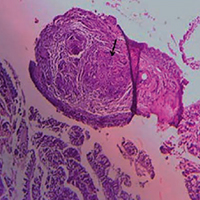Quantitative analysis of cell-free DNA by droplet digital PCR reveals the presence of EGFR mutations in non-malignant lung pathologies

All claims expressed in this article are solely those of the authors and do not necessarily represent those of their affiliated organizations, or those of the publisher, the editors and the reviewers. Any product that may be evaluated in this article or claim that may be made by its manufacturer is not guaranteed or endorsed by the publisher.
Authors
Tyrosine kinase inhibitors (TKIs) targeting epidermal growth factor receptor (EGFR) are effectively used in treatment of non-small cell lung cancer (NSCLC). Mutation profile of tyrosine kinase domain of EGFR determines the eligibility of the patients for tyrosine kinase inhibitor (TKI) therapy. Liquid biopsy, which relies on circulating tumor-derived nucleic acids, has emerged as an effective tool in lung cancer management with proven diagnostic, prognostic and predictive applications. We screened 100 subjects, suspected to have lung malignancy, for four hotspot mutations including three activating (G719S, Ex19del E746-A750 and L858R) and one acquired (T790M, de novo) in EGFR gene by droplet digital PCR (ddPCR). While 97 subjects were subsequently confirmed to have lung malignancy based on histo/cytopathological studies, three cases turned out to be non-malignant lung pathologies that were completely cured by antibiotic therapy. Intriguingly, ddPCR revealed the presence of EGFR mutations in these non-malignant subjects. Two cases showed the presence of G719S and T790M mutations respectively and another had compound mutations (T790M and L858R). The detection of EGFR mutations in non-malignant pulmonary conditions opens up a new area of research.
How to Cite

This work is licensed under a Creative Commons Attribution-NonCommercial 4.0 International License.






